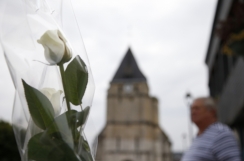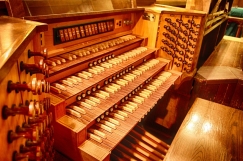All things bright and beautiful is a lovely old hymn that's still sung in many churches today, especially by children and especially at harvest. It's delightful, painting beautiful pictures of the natural world.
It's sometimes assumed to be an anti-evolution hymn, written in answer to Charles Darwin's On the Origin of Species – no, they didn't evolve, God made them. But while it might have been sung with more gusto by people who didn't believe in evolution, that isn't why it was written. It first appeared in 1848, while Darwin's book was published in 1859.
However, it's a hymn with a dark side that we don't usually notice – and that date is the clue.
Its author was the Irish hymn-writer Mrs Cecil Frances Alexander (1818-1895), who was to marry a Church of Ireland clergyman who became Bishop of Derry and Archbishop of Armagh. She was strongly influenced by the Oxford Movement, a High Church movement in England that was highly conservative and had no time at all for popular causes like political reform or the plight of the working classes.
Mrs Alexander was deeply involved in charitable work. Money from her books, and from this hymn helped to support the Derry and Raphoe Diocesan Institution for the Deaf and Dumb, which was founded in 1846.
There is one verse which is usually omitted in modern hymn-books:
The rich man in his castle,
The poor man at his gate;
God made them, high or lowly,
And ordered their estate.
Nowadays the idea that we should all know our place and defer to our betters grates on us. But that was the sort of message preached in many HIgh Church pulpits Sunday by Sunday.
The real tragedy behind that verse lies in when and where it was written. Mrs Alexander was rooted in Protestant Ireland, and a stalwart defender of the establishment. The 'rich man in his castle' was an English Protestant; the 'poor man at his gate' was an Irish peasant. The Irish potato famine killed a million people in Ireland between 1845 and 1852, and caused another million to emigrate, mainly to the United States. There were terrible scenes as tenants were evicted from their cottages, unable to pay the rent. Cannibalism was not unknown. The government's response was completely inadequate.
All things bright and beautiful was written while this was at its height.
There's no reason to suppose Mrs Alexander was anything other than horrified by the famine whose effects she must have seen. But there's something chilling at the thought that she could live through such an experience and remain completely unchallenged by any thought that things ought to be different; that God did not "order the estate" of those who were dying of hunger and cold while others were well-fed and warm.
It's a lovely hymn, but it's good that we don't sing that verse. And perhaps it's a cautionary tale: what are the signs of our own times that can challenge us and and open up new ways of thinking about God?
Follow Mark Woods on Twitter: @RevMarkWoods

















